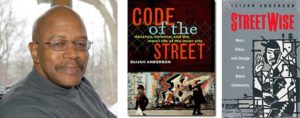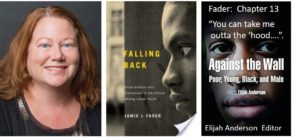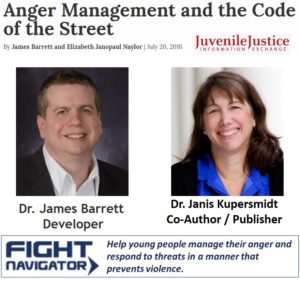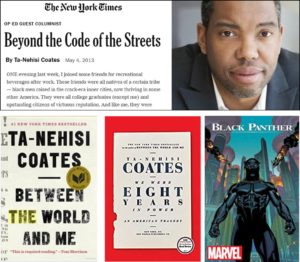Elijah Anderson
Sterling Professor of Sociology and of African American Studies at Yale University
Anderson developed the Code of the Street model out of 14 years of ethno-graphic research and sociological analysis of a Philadelphia neighborhood. His writing explains how how racism, the deteriorating economic base of inner city neighborhoods and resulting social dysfunction have given rise to a world view and behavioral schema Anderson calls the Code of the Street. His research and writing explains both both the adaptive rationality of the Code of the Street and how it accounts for many of the social and behavioral dysfunctions of communities and individuals socialized as per the Code of the Street. The Code of the Street model has been validated and extended in over 25 years of research in multiple academic disciplines.

Jamie Fader
Associate Professor of Criminal Justice, Temple University
Fader brings Anderson’s Code of the Street concept to bear on the her analysis of how Samenow and Yochelson’s Criminal Personality Theory, (which is virtually canonical in criminal justice theory and juvenile justice clinical treatment) uniquely problematic for African American juvenile offenders socialized to the Code of the Street, especially as applied in practice in most residential juvenile justice facilities.

James Barrett and Janice Kupersmidt
Havard Medical School and CEO / Senior Research Scientist Innovative Research and Training, respectively
James Barrett is an Instructor of Psychology in Psychiatry at the Harvard Medical School. However, it is his work with youth in Cambridge, Massachusetts schools and those involved with the Cambridge Police Department that is most relevant to this project. While teaching cognitive behavioral anger management Dr. Barrett kept getting push back from African American youth clients from tough inner city neighborhoods. He concluded this was due to their socialization by a widely shared survival-oriented ethos Elijah Anderson calls the Code of the Street.
Barrett partnered with research and clinical child psychologist Janice Kupersmidt, developer/author of multiple evidence-based intervention curricula and programs, in developing the Fight Navigator program. Fight Navigator takes account of the Code of the Street in helping urban youth identity strategies for avoiding violent conflict that doesn’t cost them peer respect or undermine their street rep. Fight Navigator is arguably the first and currently only other known anger management and violence prevention program/curriculum that exemplifies Non-coercive Adversary Behavior Management, though its development predates NABM’s conceptualization by several years.

Ta-Nehisi Coates
Author, journalist, educator and comic book writer, (Marvel Comics’ Black Panther and Captain America)
As profound as Ta-Nehisi Coates’ is as a commentator on and analyst of issues relevant to this project, his primary value in terms of NAMB curriculum content is as a source of compellingly written biographical anecdotes in his books and articles that illustrate theoretical concepts and content drawn from academic research. Coates’ is only the first of what will become many African American stories and voices enlisted to communicate and illustrate Non-coercive Adversary Behavior Management curricula content to urban youth out of a shared community context. However, few other voices can match Coates’ combination of literary and theoretical heft and the pop culture cachet as a writer of superhero comic books.


